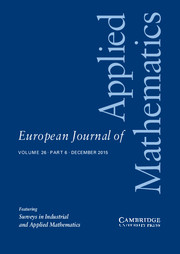Crossref Citations
This article has been cited by the following publications. This list is generated based on data provided by
Crossref.
Irons, L.
Collis, J.
and
O'Dea, R.D.
2017.
Modeling of Microscale Transport in Biological Processes.
p.
311.
HOLDEN, E. C.
COLLIS, J.
BROOK, B. S.
and
O’DEA, R. D.
2018.
A MULTIPHASE MULTISCALE MODEL FOR NUTRIENT LIMITED TISSUE GROWTH.
The ANZIAM Journal,
Vol. 59,
Issue. 4,
p.
499.
HOLDEN, E. C.
CHAPMAN, S. J.
BROOK, B. S.
and
O’DEA, R. D.
2019.
A MULTIPHASE MULTISCALE MODEL FOR NUTRIENT-LIMITED TISSUE GROWTH, PART II: A SIMPLIFIED DESCRIPTION.
The ANZIAM Journal,
Vol. 61,
Issue. 4,
p.
368.
Landa-Marbán, David
Bødtker, Gunhild
Kumar, Kundan
Pop, Iuliu S.
and
Radu, Florin A.
2020.
An Upscaled Model for Permeable Biofilm in a Thin Channel and Tube.
Transport in Porous Media,
Vol. 132,
Issue. 1,
p.
83.
Yadav, K.S.
and
Dalal, D.C.
2021.
The heterogeneous multiscale method to study particle size and partitioning effects in drug delivery.
Computers & Mathematics with Applications,
Vol. 92,
Issue. ,
p.
134.
Jin, Wang
Spoerri, Loredana
Haass, Nikolas K.
and
Simpson, Matthew J.
2021.
Mathematical Model of Tumour Spheroid Experiments with Real-Time Cell Cycle Imaging.
Bulletin of Mathematical Biology,
Vol. 83,
Issue. 5,
Penta, Raimondo
Ramírez-Torres, Ariel
Merodio, José
and
Rodríguez-Ramos, Reinaldo
2021.
Effective governing equations for heterogenous porous media subject to inhomogeneous body forces.
Mathematics in Engineering,
Vol. 3,
Issue. 4,
p.
1.
Akbarpour Ghazani, Mehran
Saghafian, Mohsen
Jalali, Peyman
and
Soltani, Madjid
2021.
Mathematical simulation and prediction of tumor volume using RBF artificial neural network at different circumstances in the tumor microenvironment.
Proceedings of the Institution of Mechanical Engineers, Part H: Journal of Engineering in Medicine,
Vol. 235,
Issue. 11,
p.
1335.
Giusteri, Giulio G.
and
Penta, Raimondo
2022.
Periodic rhomboidal cells for symmetry-preserving homogenization and isotropic metamaterials.
Mechanics Research Communications,
Vol. 126,
Issue. ,
p.
104001.
Varella, Vinicius
Quintela, Barbara de M.
Kasztelnik, Marek
and
Viceconti, Marco
2022.
Effect of particularisation size on the accuracy and efficiency of a multiscale tumours' growth model.
International Journal for Numerical Methods in Biomedical Engineering,
Vol. 38,
Issue. 12,
Luckins, Ellen K.
Breward, Christopher J. W.
Griffiths, Ian M.
and
Please, Colin P.
2023.
A homogenised model for the motion of evaporating fronts in porous media.
European Journal of Applied Mathematics,
Vol. 34,
Issue. 4,
p.
806.
Akalın, Ali Aykut
Dedekargınoğlu, Barış
Choi, Sae Rome
Han, Bumsoo
and
Ozcelikkale, Altug
2023.
Predictive Design and Analysis of Drug Transport by Multiscale Computational Models Under Uncertainty.
Pharmaceutical Research,
Vol. 40,
Issue. 2,
p.
501.
Yadav, K.S.
and
Dalal, D.C.
2023.
Effects of cell orientation on drug delivery into biological tissues: A computational study.
Applied Mathematical Modelling,
Vol. 119,
Issue. ,
p.
156.
Kent, Amy
Waters, Sarah L.
Oliver, James M.
and
Chapman, Stephen J.
2025.
Homogenised models of nutrient transport in a fibrous bioreactor scaffold.
European Journal of Applied Mathematics,
p.
1.

